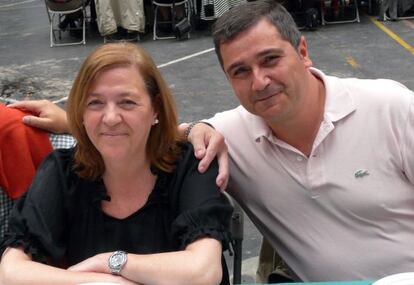Help comes too late for woman who the banks hounded out of her home
Amaya Egaña's suicide occurred days before decree to stem flood of evictions

It may have been that Amaya Egaña was a Good Samaritan to someone who remains unknown. But for many more people she has come to symbolize the plight of hundreds of thousands of Spaniards who have lost their homes because they have been unable to pay their mortgages.
Egaña -- a professional woman and former politician who wasn't jobless -- couldn't take it anymore. The bank had foreclosed on her home in Barakaldo, Bizkaia, in the Basque Country, and on November 9 bailiffs were scheduled to come and evict her and her family.
Moments before they arrived, the 53-year-old Egaña stepped up on a chair near a window and threw herself from her four-story property on to Escuela Artes y Oficio Street. She died instantly.
Her suicide was one of two related to the eviction crisis that took place within days of each other. Still, no one can understand why a middle-class working woman, whose husband was also employed, and well-known within local political circles, could have fallen behind in her mortgage payments and become so despondent as to want to take her own life.
"Everything is so confusing. We still don't know anything yet," her brother-in-law Iñaki Asensio told reporters that day. "Her husband had no idea they were going to be evicted."
According to initial press reports, Egaña, without her husband's knowledge, had put up her home as a guarantee for someone who eventually fell back on mortgage payments. Other reports said it was on behalf of her brother's business in Eibar - versions that he quickly denied.
Amaya may not have benefited from the moratorium on home evictions
"They have been freely and indecently saying that she signed a guarantee for me, but that is completely false," Alberto Egaña told Europa Press, adding that he planned legal action.
The mourners' list at Egaña's funeral the following day made up a who's who of Basque politics, especially within the Basque Socialist Party (PSE). Basque regional premier Patxi López and his wife were there, as was his interior chief Rodolfo Ares. The mayors of Barakaldo and Portugalete, Tontxu Rodríguez and Mikel Torres, respectively, and Euskadi UGT secretary general Dámaso Casado, were also present. No one wanted to talk to the press.
But earlier, López, a family friend, said via his Twitter account that he was "devastated" by her death and called for "solutions" to the eviction problem because "people cannot go on living like this."
A partial solution was reached on Thursday when the Cabinet issued a decree ordering a two-year moratorium on the evictions of particularly vulnerable people. Still, Egaña would probably not have fit into any of the categories.
Born in 1959, Egaña was the daughter of one of the founders of the Socialist Party in Gipuzkoa, Ramón Egaña, who was also president of the PSE in Eibar. She was the only daughter among four siblings.
In 1983, she was included on the Socialist slate for municipal council candidates with José Luis de los Toyos at the head of the list. She served on the Eibar council until 1986.
She later moved to Barakaldo with her husband, José Manuel Asensio, who became security councilor in the Bizkaia town under Socialist Mayor Carlos Pera.
At the time of her death, Egaña was head of human resources at Transportes Colectivos, the transportation firm that runs the public Bizkaibus line. Co-workers said that the day before she killed herself she didn't appear anxious, worried or afraid, and carried out her daily routine as normal.
According to family friends, Egaña had been devastated some years back over the deaths of her two eldest brothers: one was found dead in his home and the other died after suffering severe depression.
Besides her husband, Egaña is survived by her 21-year-old son Daniel, a university student.
Tu suscripción se está usando en otro dispositivo
¿Quieres añadir otro usuario a tu suscripción?
Si continúas leyendo en este dispositivo, no se podrá leer en el otro.
FlechaTu suscripción se está usando en otro dispositivo y solo puedes acceder a EL PAÍS desde un dispositivo a la vez.
Si quieres compartir tu cuenta, cambia tu suscripción a la modalidad Premium, así podrás añadir otro usuario. Cada uno accederá con su propia cuenta de email, lo que os permitirá personalizar vuestra experiencia en EL PAÍS.
¿Tienes una suscripción de empresa? Accede aquí para contratar más cuentas.
En el caso de no saber quién está usando tu cuenta, te recomendamos cambiar tu contraseña aquí.
Si decides continuar compartiendo tu cuenta, este mensaje se mostrará en tu dispositivo y en el de la otra persona que está usando tu cuenta de forma indefinida, afectando a tu experiencia de lectura. Puedes consultar aquí los términos y condiciones de la suscripción digital.








































